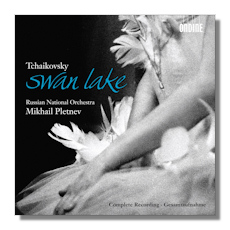
The Internet's Premier Classical Music Source
Related Links
- Tchaikovsky Reviews
- Latest Reviews
- More Reviews
-
By Composer
-
Collections
DVD & Blu-ray
Books
Concert Reviews
Articles/Interviews
Software
Audio
Search Amazon
Recommended Links
Site News
 CD Review
CD Review
Piotr Ilyitch Tchaikovsky

Swan Lake, Op. 20
Russian National Orchestra/Mikhail Pletnev
Ondine ODE1167-2D 2CDs 78:44 + 64:08
Piotr Tchaikovsky's first ballet Swan Lake (1877) has fared rather well on disc. The score – melodious, brilliantly orchestrated, imaginatively constructed, evocative and dramatic – has understandably always been tempting conductors, seasoned in the theatre or not, to take it out of its balletic context, often with great conviction. From the pioneering, first-ever complete version by Antal Doráti with the Minneapolis Symphony Orchestra in 1954, by way of the colorful, supremely elegant renderings by ballet specialists like Pierre Monteux and Ernest Ansermet, the incisive Ferenc Fricsay or the surprising Herbert von Karajan (for abridged versions or the suite), to the tragic full-length ones by Evgeny Svetlanov, Anatole Fistoulari, Gennady Rozhdestvensky, Vladimir Fedoseyev among several others: in any case there is no doubt that the music of Swan Lake can easily stand on its own as powerful lyrical drama without words. And now we have Mikhail Pletnev and the Russian National Orchestra on the Finnish label Ondine trying their hand at the complete ballet.
Mikhail Pletnev has proven a very uneven conductor on disc – his Tchaikovsky and Rachmaninoff symphonic cycles remain controversial, while I found his take on Tchaikovsky's second ballet The Sleeping Beauty anything but convincing. This recording of Swan Lake from 2009 is, if anything, an even bigger disappointment. Overall, what is lacking here is imagination, a sense of atmosphere, a connection with the story – in fact, Pletnev doesn't have a story. This Swan Lake sounds like a collection of individual numbers, downplayed by Pletnev's distant and insensitive manner, his refusal to connect with the drama. Some will undoubtedly glorify this as an allegedly much-needed attempt at "de-romanticizing" Tchaikovsky, while in truth we end up with a severe case of frostbite.
The way Pletnev approaches the lakeside 2nd Act – that crucial moment in the story where the Prince meets the Swan Queen Odette for the first time – is a case in point. This set piece finds Tchaikovsky at his most evocative and gives all the cues, yet in Pletnev's hands it remains very much a non-event. Even the opening of the 2nd Act, featuring the famous oboe-driven Swan theme, refuses to take flight. Instead of setting the scene for this fateful encounter, Pletnev's deadpan rendering omits all sense of expectation and his swans bog down in a frozen pond of indifference. In the following pas d'action (No. 13/V), normally the emotional core of the whole ballet, the (uncredited) hesitant and cold violin solo never breaks the ice. The 3rd Act doesn't fare much better. In spite of some excellent solo work from the Russian National Orchestra, the national dances lack rhythmical drive and fire. The only thing that sort of works in this recording is the finale, bold, and yes, excitingly played, where Pletnev finally seems to have received a shot of adrenaline and even shares a bit of passion.
This Swan Lake is finished off in 2 CD's and that's another issue of this recording. We all know this is not an accompaniment of a theatre performance, but the way Pletnev treats some of the danced pieces is close to caricature. In what seems to be a different and now definitely bygone era conductors from the Russian School used to mold and reinvigorate scores with an often dazzling use of rubato and flair for theatricality. Pletnev, on the other hand, only distinguishes sluggish and breathless. His tempi changes often seem haphazard, while several of the allegro sections are taken in a breakneck presto, producing the sort of slapstick moments one rather expects in a Tom and Jerry cartoon (coda of the Act 1 Pas de trois, coda of the Act 3 Pas de six).
As we know from earlier recordings the Russian National Orchestra is not without merit, yet in this release neither the conducting nor the recording (in the Great Hall of the Moscow Conservatory) are of much help. Pleasantly dynamic but also dry and bass heavy, the forwardly balanced strings and woodwinds tend to sounds shrill in tutti. In fact, the recording is perfectly attuned to Pletnev's approach: unemotional, unatmospheric and ultimately brittle.
Copyright © 2012, Marc Haegeman





















